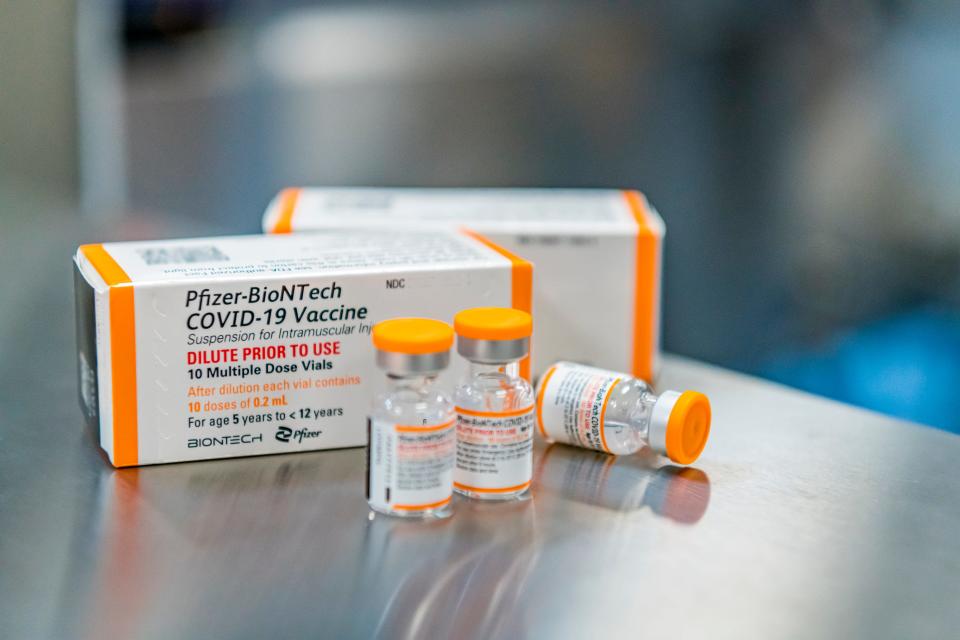COVID vaccines are safe for kids, but we need to prioritize high-risk children
- Oops!Something went wrong.Please try again later.
A lot of parents are worried about whether they can safely give the Pfizer-BioNTech vaccine to their children, even at a third the adult dose. My answer is yes, but I think children at higher risk of COVID-19 complications should get the shot first.
Dr. Paul Offit, director of the Vaccine Education Center at the Children’s Hospital of Philadelphia and a key member of the Food and Drug Administration’s Vaccines and Related Biological Products Advisory Committee, told me on my SiriusXM Doctor Radio show that the committee’s recommendation that the FDA issue an emergency use authorization of the Pfizer vaccine for ages 5 to 11 was based on the question of whether members would give the vaccine to their own young child or grandchild. After reviewing the data, their answer was a resounding yes, with a 17 to 0 vote, and one abstention.
The full FDA agreed a few days later.
Kid-friendly vaccines that work
The plan for this rollout is a big improvement over the prior one for teens. It is far more kid-friendly, as it will take place in the pediatrician’s office, with a vaccine that can be refrigerated and administered at a third the dose, using smaller needles.
Dr. David Kessler, former FDA commissioner, pediatrician and chief science adviser to the White House COVID-19 response team, told me he played a role in making sure this happened.
I think this is a much better approach, hopefully leading to conversations between doctors, patients and parents, as opposed to superimposed mandates or dictums by government.
Offit told me the vaccine appeared quite safe for kids and should be given to all, because though kids with underlying health conditions such as obesity, diabetes and cancer are more at risk for hospitalization, at the same time MIS-C, the multisystem inflammatory syndrome that has affected at least 2,000 children with COVID in this age group, as well as other long-term COVID effects, are more unpredictable and often strike perfectly healthy children.

Offit pointed out that there have been 1.9 million cases of COVID for kids ages 5 to 11, with 8,600 hospitalizations and a third requiring ICU admission, and more than a hundred deaths – much more than most people realize.
Children represented 3% of cases at the beginning of the pandemic, Offit said, but the percentage is now closer to 27%. He reviewed the Pfizer study data for 5- to 11-year-olds and said that 2,400 children were studied, with 1,600 receiving the vaccine and 800 getting a placebo. There was a 91% efficacy at preventing infection. Offit feels strongly that this plus the safety data is sufficient justification for widespread vaccination.
Dr. Sterling N. Ransone Jr.: Kids 5-11 must get COVID vaccine. Trusted family physicians must be the ones to give it.
But not all committee members see it the same way just because they voted yes. Dr. H. Cody Meissner, chief of pediatric infectious diseases at Tufts Medical Center, told me in an interview on SiriusXM that he voted yes only to ensure that children in high-risk groups receive the vaccine, and that over time, as more safety data piles up, as thousands and then millions are vaccinated, hopefully confirming safety, that’s when he feels the vaccine can be given to all fully healthy children.
Daniel Alholm: Let's treat Americans injured by the COVID-19 vaccine fairly
This layered approach is exactly what Dr. Offit doesn’t want to see happen, but I agree with Dr. Meissner: We can offer it to all children, prioritizing those most at risk of severe cases, including the obese, then use the accumulated safety data to help persuade hesitant parents of healthy children that their kids should take the shots, too.
COVID-19 or vaccine? Threats to kids
No matter how you look at it, COVID-19 is far more dangerous to the individual child as well as to the society as a whole than the vaccine is. In fact, the vaccine appears to be quite safe for children, despite rare instances of myocarditis (heart inflammation), usually quite mild, predominantly in teenage boys.

I think the dosage needs to be lower and the interval between doses greater, not just for children ages 5-11 but for most under the age of 18.
Sooner or later, almost all children should take the vaccine not only for their own sake but also for the sake of those around them. Not because they are forced to by anyone, but in consultation with their pediatrician.
Dr. Marc Siegel, a member of USA TODAY's Board of Contributors and a Fox News medical correspondent, is a professor of medicine and medical director of Doctor Radio at NYU Langone Health. His latest book, "COVID: the Politics of Fear and the Power of Science," was published last fall. Follow him on Twitter: @DrMarcSiegel
You can read diverse opinions from our Board of Contributors and other writers on the Opinion front page, on Twitter @usatodayopinion and in our daily Opinion newsletter. To respond to a column, submit a comment to letters@usatoday.com.
This article originally appeared on USA TODAY: COVID vaccines: Pandemic more dangerous for kids than the shots

